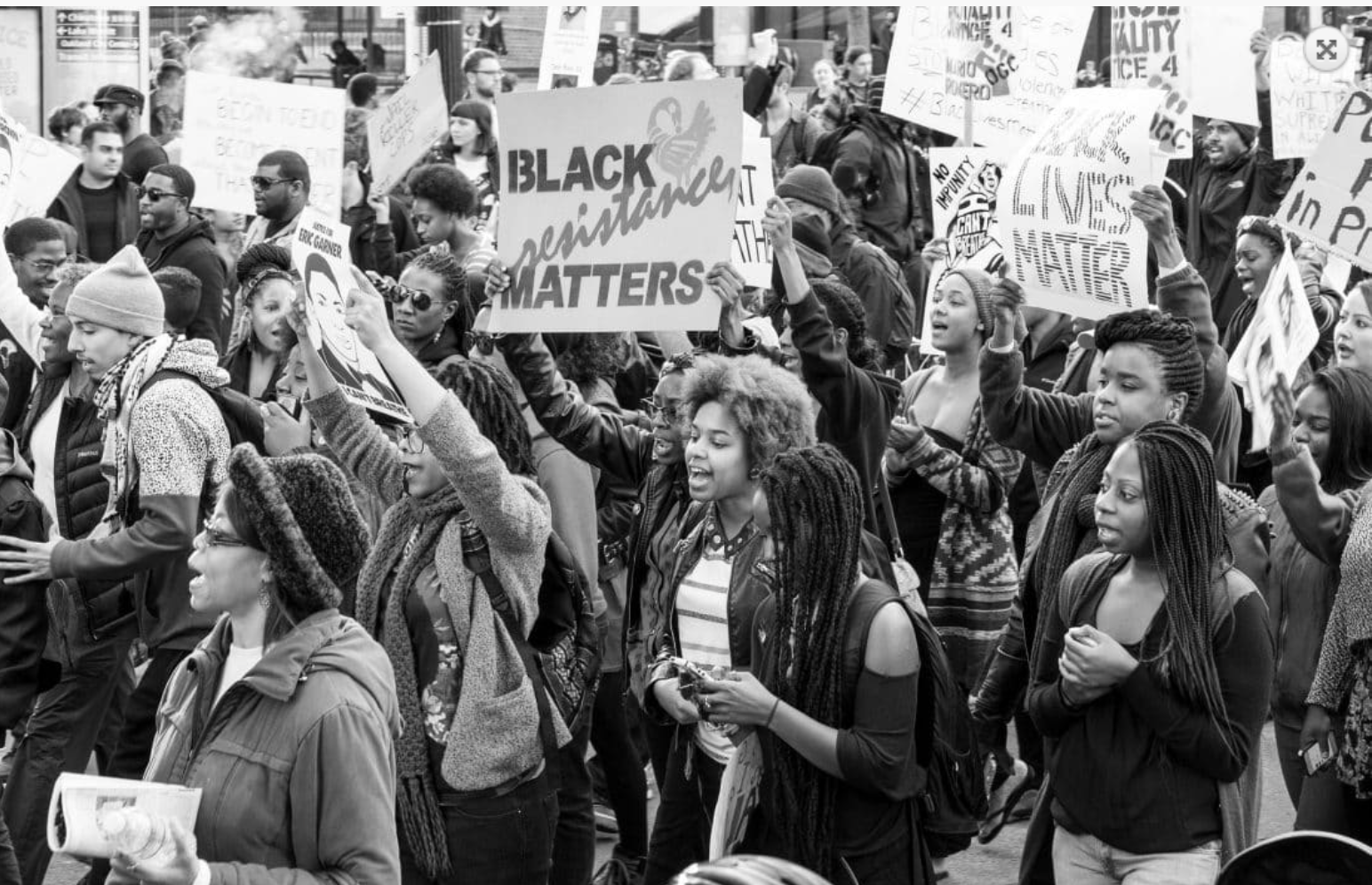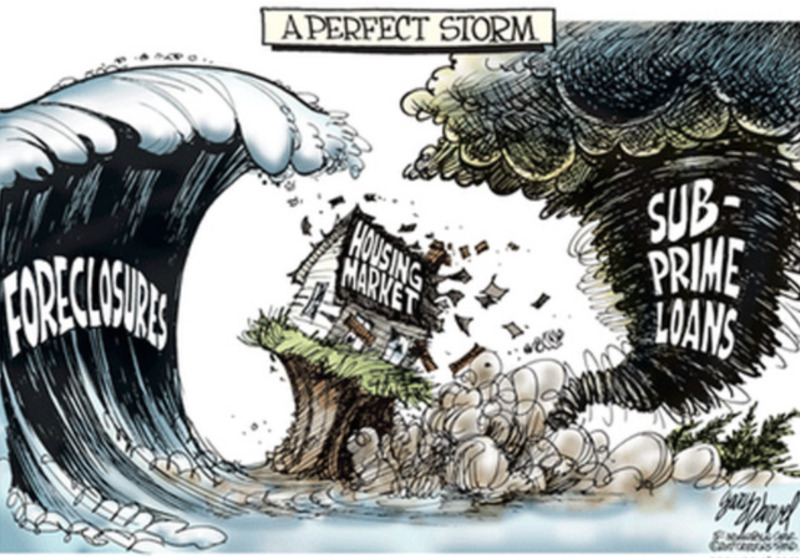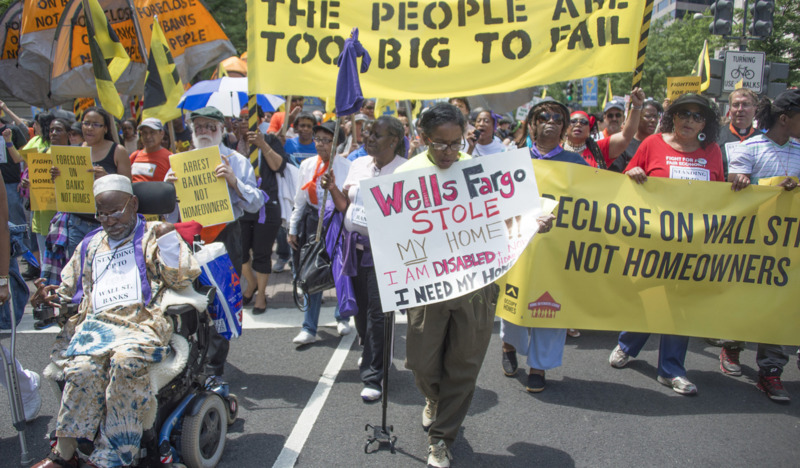
Reproductive and Housing Justice During the 2008 Financial Crisis
The 2008 financial crisis is, unfortunately, well within recent memory for the majority of people reading this page. And for those whom it isn't, it's extremely likely that we all have a parent, family member, or friend who lived through the uncertainty and fear of those first few weeks that, like a malignant illness, turned into months and then painfully into years.
My own family was acutely impacted by the domino effect of the housing market crash, banks bottoming out, and loans of all sorts being recalled or frozen. My father was let go from his twenty-three year long position as an audio engineer a few months into the recession, a change which plunged my family into financial insecurity and the instability that comes with having one's health insurance - and that of their family's - connected to their job.
Despite the stress, fear, and many sleepless nights I know my parents experienced, at the end of the day we were still relatively "lucky." We never lost our home and, even though things were tight, my siblings and I never missed a meal and we could still afford the occasional shopping trip for new school clothes or supplies. I went to college, a piece of good fortune that, now I'm getting myself through graduate school, I realize was only a few steps short of a miracle.
Lucky. That's what we were, even though it certainly didn't feel like it. Lucky to have not lost our home and been forced to move in with relatives, or even worse make do from our car or a motel room. Lucky to have kept up with doctor's and dentist's appointments because my mom got a new job that included health insurance. Lucky, even though, really, we and so many others weren't.
This project covers many purposes. On one hand, this website is my attempt to understand, albeit from a scholarly perspective, the 2008 financial crisis and why it was so devastating for lower-middle income families like my own. At its core, however, this project also combines my research interests of reproductive justice and how it intersects with and shapes other fields including housing and economic justice.
In the pages that follow, I will argue that unlike popular representations of the 2008 financial crash as the "Great Recession," a term that implies a one-off crisis that was overshadowed only by the Great Depression, the roots of this socio-economic disaster stretched back far longer than the handful of years unethical subprime lenders had been operating. Instead, I begin my narrative in the late 1980s, when "welfare reform" proposals amassed astounding levels of social and political support and made reproductive and housing security for single mothers, single women, and low-middle income families all the more precarious.
Furthermore, in line with scholars Laura Briggs, Dorothy Roberts, Nathalie Fixmer-Oraiz, and Laura Gottesdiener, I similarly argue that it's imperative we examine not just the longer history of the 2008 crash but also deconstruct how, at its center, a crisis that seemed to be about dollars and cents contained elements of the oldest racialized-gendered tropes in the U.S. history playbook. Indeed, one could contend that the generational histories of redlining, housing segregation, unfair mortage lending, reproductive injustice, employment discrimination, and massive wealth inequalities all played a part in laying the shoddy foundation of the U.S. economy that inevitably collapsed under its own poorly constructed weight.
Since the 2008 financial crash, a number of law, social welfare, economic, and sociology scholars have produced excellent scholarship analyzing the starkly racial and gendered makeup of the people who were most likely to be targeted for and own predatory loans.1 Their research has provided invaluable insights into the social and economic scaffolding that allowed the housing market to become as bloated and vulnerable as it did, but few have used reproductive justice as a central framework for their argument or specifically operated from a historical perspective. I posit that by taking up both these approaches using a reproductive justice and socio-economic analysis, we will have a more holisitic understanding of the pernicious influences that shifted the under-representation of people and women of color in the housing market to the over-representation of this same population.
There is a reason why families, single mothers, single women, and women of color were some of the populations worst affected by the 2008 financial crash. There is a reason - many, in fact - why the Chicago Tribune was printing articles from 2007-2012 with headlines like "Little to Save Single Women Struggling in Tough Economic Times," "The Baby Recession," and "Study Points to Gender Gap: Women Pay More for Loans."2 This project is about the reasons why reproductive justice is at the center of one of the worst economic and housing collapses the country has ever seen.
Furthermore, this story is concerned just as much with the people and families who were left to struggle, scrimp, and save in any way possible to keep the water bill paid and car running. While I will certainly spend a significant amount of time tracing the larger, top-down political and economic forces that structured the bones of 2008 financial crash, I strive at all times to remain focused on the individual people and familes who were left to deal with the worst of the after-effects. Countless lives were permanently changed as the U.S. and global economy fell like dominos, and it's these lives, these stories, that this project is most interested in telling.
End Notes
[1] For a brief overview of scholarship on the 2008 financial crisis, please see the following list: Amy Baker, "Eroding the Wealth of Women: Gender and the Subprime Foreclosure Crisis," Social Service Review 88, no. 1 (March 2014): 59-91, Ping Cheng, Zhenguo Lin and Yingchun Liu, "Do Women Pay More for Mortgages?" The Journal of Real Estate Finance and Economics 43 (November 2011): 423-440, Rachel Drew, "Buying for Themselves: An Analysis of Unmarried Female Home Buyers," Joint Center for Housing Studies at Harvard University (June 2006): 1-23, Nicholas Hartigan, "No One Leaves: Community Mobilization as a Response to the Foreclosure Crisis in Massachusetts," Harvard Civil Rights-Civil Liberties Law Review 45, no. 1 (Winter 2010): 181-204, and C.S. Ponder and Elvin Wyly. "Gender, Age, and Race in Subprime America," Housing Policy Debate 21, no. 4 (October 2011): 529-564.
[2] Susan Chandler, "The Baby Recession: Economic Woes Begin to Affect the Most Personal of Decisions: Whether or When to have Children," Chicago Tribune, Dec 23, 2008, Gail MarksJarvis, "Little to Save Single Women Struggling in Tough Economic Times," Chicago Tribune, Dec 03, 2008, and Bob Tedeschi, "Study Points to Gender Gap: Women Pay More for Loans," Chicago Tribune, Jan 28, 2007.


